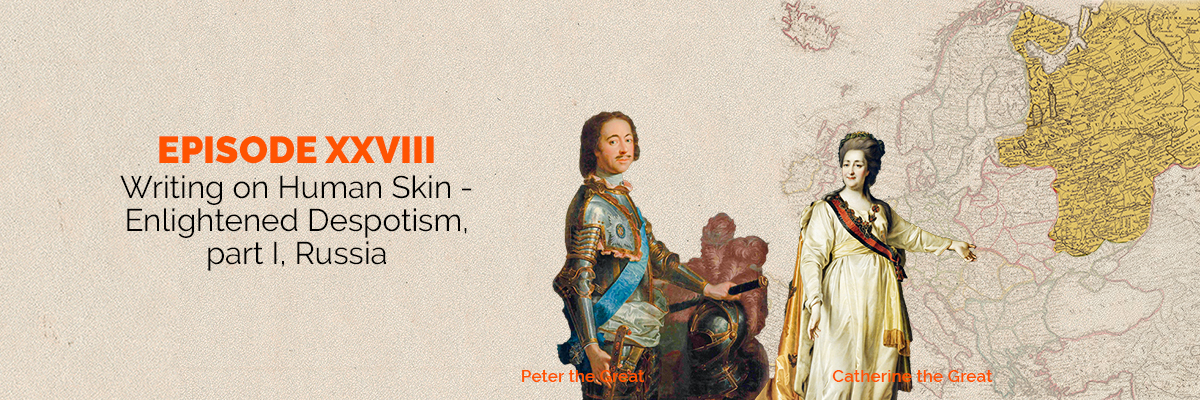The Enlightenment’s emphasis on science, progress, tolerance and rationality attracted not only philosophers — even absolute monarchs dreamt of “Enlightenment Now.” But how do you incorporate the enlightenment’s revelations without undermining the traditions and ideas that legitimate absolute rule in the first place? Fortunately for Europe’s modernizing rulers, some of the continent’s most prominent 18th century philosophers — including Voltaire — stood ready to praise the new winds of “enlightened despotism” that took hold in places like Russia and Prussia.
In this episode, we cover Russia — the ground zero of enlightened despotism — and Tsar Peter the Great, who, according to Voltaire, single-handedly dragged the country across both time and place from the Dark Ages and Asia into the 18th century and Europe.
Among the topics tackled are:
- How the benefits of modern science, learning and the fresh air of religious tolerance attracted Peter the Great;
- How Peter believed in “moving fast and breaking tradition” and combined enlightenment reforms with ruthless suppression;
- How Peter kicked off his modernizing reform with a fashion statement: ordering men to shave their beards and women to dress like Parisians;
- How Peter’s reforms planted the seed for more liberal Enlightenment reforms;
- How Catherine the Great introduced the idea and principle of freedom of speech into Russia’s deeply traditional culture;
- How Catherine modeled her “Great Instruction” on the ideas of Montesquieu and Beccaria and corresponded with thinkers like Voltaire, Diderot, and d’Alembert;
- How Catherine reversed her course and tightened censorship;
- How the French Revolution caused Catherine to crack down on radical Russian writers like Alexander Radishchev and Nikolay Novikov; and
- How Alexander Radishchev relied on “freedom of the press as the great bulwark of liberty” to write the most radical and robust defense of free speech in Russian history.
You can subscribe and listen to Clear and Present Danger on Apple Podcasts, Google Play, YouTube, TuneIn, and Stitcher, or download episodes directly from SoundCloud.
Stay up to date with Clear and Present Danger on the show’s Facebook and Twitter pages. Email us feedback at freespeechhistory@gmail.com.
Bibliography:
- Aleksandrova, K. (2010, August 22). Catherine’s Maidens – Beautiful, Plain, Noble. The Moscow Times. Retrieved 9 July 2019 from here.
- Blom, P. (2011). A Wicked Company. Basic Books. Kindle Edition.
- Bobrovnikov, V. (2006). Islam in the Russian Empire. In: Lieven, D. (ed.). The Cambridge History of Russia. Cambridge University Press.
- Engel, B.A. (2006). ‘Women, the family and public life’. In: Lieven, D. (ed.). The Cambridge History of Russia. Cambridge University Press.
- Friedman, T.L. (2017, November 23). Saudi Arabia’s Arab Spring, at Last: The crown prince has big plans for his society. The New York Times. Retrieved 9 July 2019 from here.
- Israel, J. (2011). Democratic Enlightenment: Philosophy, Revolution, and Human Rights, 1750-1790. Oxford University Press.
- Israel, J. (2010). A revolution of the mind: Radical Enlightenment and the intellectual origins of modern democracy. Princeton University Press.
- Israel, J. (2008). Enlightenment Contested: Philosophy, Modernity, and the Emancipation of Man 1670-1752. Oxford University Press.
- Israel, J. (2001). Radical Enlightenment: Philosophy, Modernity, and the Emancipation of Man 1670-1752. Oxford Universty Press.
- Hughes, L. (2006). Russian culture in the eighteenth century. In: Lieven, D. (ed.). The Cambridge History of Russia. Cambridge University Press.
- Hughes, L. (2002). Peter the Great: A Biography. Yale University Press.
- Kalin, S. (2019, March 27). Saudi women activists detail torture allegations in court. Retrieved 8 July 2019 from here.
- Kumar, K. (2017). The Russian and Soviet Empires. In: Visions of Empire: How Five Imperial Regimes Shaped the World. Princeton University Press.
- Lieven, D. (2006) (ed.). The Cambridge History of Russia. Cambridge University Press.
- Papmehl, K.A. (1971). Freedom of Expression in Eighteenth Century Russia. The Hague: Martinus Nijhoff.
- Powers, E. (ed.) (2011). Freedom of Speech: The History of an Idea. Bucknell University Press.
- Riasanovsky, N.V. (1985). The Image of Peter the Great in Russian History and Thought. Oxford University Press.
- Robertson, J. (2015). The Enlightenment. A Very Short Introduction. Oxford University Press.
- Shank, J.B. (2015). Voltaire. The Stanford Encyclopedia of Philosophy (Fall 2015 Edition), Zalta, E.N. (ed.). Retrieved 8 July 2019 from here.
- Shishkin, M. (2013, July 1). Poets and Czars: From Pushkin to Putin: the sad tale of democracy in Russia. The New Republic. Retrieved 9 July 2019 from here.
- Smith, D. (2011). ‘Alexander Radishchev’s Journey from St. Petersburg to Moscow and the Limits of Freedom of Speech in the Reign of Catherine the Great’. In: Powers, E. (ed.). Freedom of Speech: The History of an Idea. Bucknell University Press.
- Walton, C. (2009). Policing Public Opinion in the French Revolution: The Culture of Calumny and the Problem of Free Speech. Oxford University Press. Kindle Edition
- Zaretsky, R. (2017, July 30). “I Write on Human Skin”: Catherine the Great and the Rule of Law. Los Angeles Review of Books. Retrieved 9 July 2019 form here.
Primary sources
- Catherine the Great (1767a). Proposals for a New Law Code. Retrieved from here.
- Catherine the Great (1767b). Decree on serfs. Retrieved from here.
- de Missy, J. (c. 1730). Life of Peter the Great. Retrieved from here.
- Gordon, A. (1718). History of Peter the Great. Retrieved from here.
- Montesquieu, C.L. (1748). The Spirits of Laws. From: Complete Works, 4 vols. (1777). Retrieved 9 July 2019 from here.
- Von Korb, J. (1698-9). Diary. Retrieved from here.
- Voltaire: Letters On England. Translated and introduced by L. Tancock. Penguin. Kindle edition.
- Voltaire (1764). Philosophical dictionary. Retrieved from here.
- Voltaire (1750). La Voix du Sage et du Peuple. From: Œuvres complètes de Voltaire, Garnier, tome 23 (p. 465-472). Retrieved 8 July 2019 from here.
Great podcasts covering this subject
- Russian Rulers History Podcast by Mark Schauss. Episodes 29–51.
